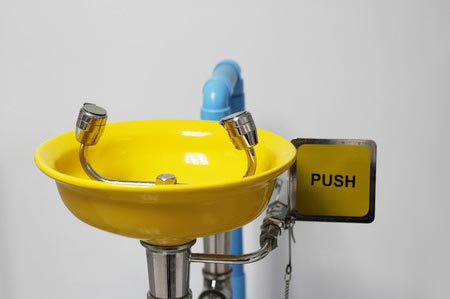Eye Wash Safety
We all hope we never need an eyewash station, but if an accident should happen, it’s our wish that it’s clean and accessible. If a foreign particle enters the eyes, an emergency eyewash station is the most important initial step in first-aid treatment. Chemical burns to the eye are among the most urgent of emergencies.

Eyewash REQUIRED if:
-
The Safety Data Sheet indicates a chemical in use is caustic, toxic, or corrosive;
- The SDS informs that serious eye damage may result; or
- Warnings such as “causes chemical burns” or “causes permanent eye damage” are posted on container labels.
Proper Use:
Employees who are exposed to possible chemical splashes must know in advance how to use an eyewash/deluge station properly:
-
Immediately after the accident, flood the eye with water or eyewash solution, using fingers to keep the eye open as wide as possible. Water may be colder than body temperature, which can be uncomfortable; but it is imperative to irrigate for the recommended period of time.
-
Roll the eyeball as much as possible to remove any loose particles retained under the eyelids.
-
Do not put anything except water into the eyes to remove particles.
-
The eyes should be irrigated for at least 15 minutes and the victim transported to a medical facility immediately. Continue irrigation of eyes during transport. The best way to accomplish this may be to have a portable eyewash system ready that can be carried along.
Don’t let the lights go out, wear your eye protection!!!
Download flyer: STOTW_435_Eye Wash Safety.pdf (222.87 kb)
Download Spanish flyer: STOTW_435_Eye Wash Safety_esp.pdf (223.76 kb)

